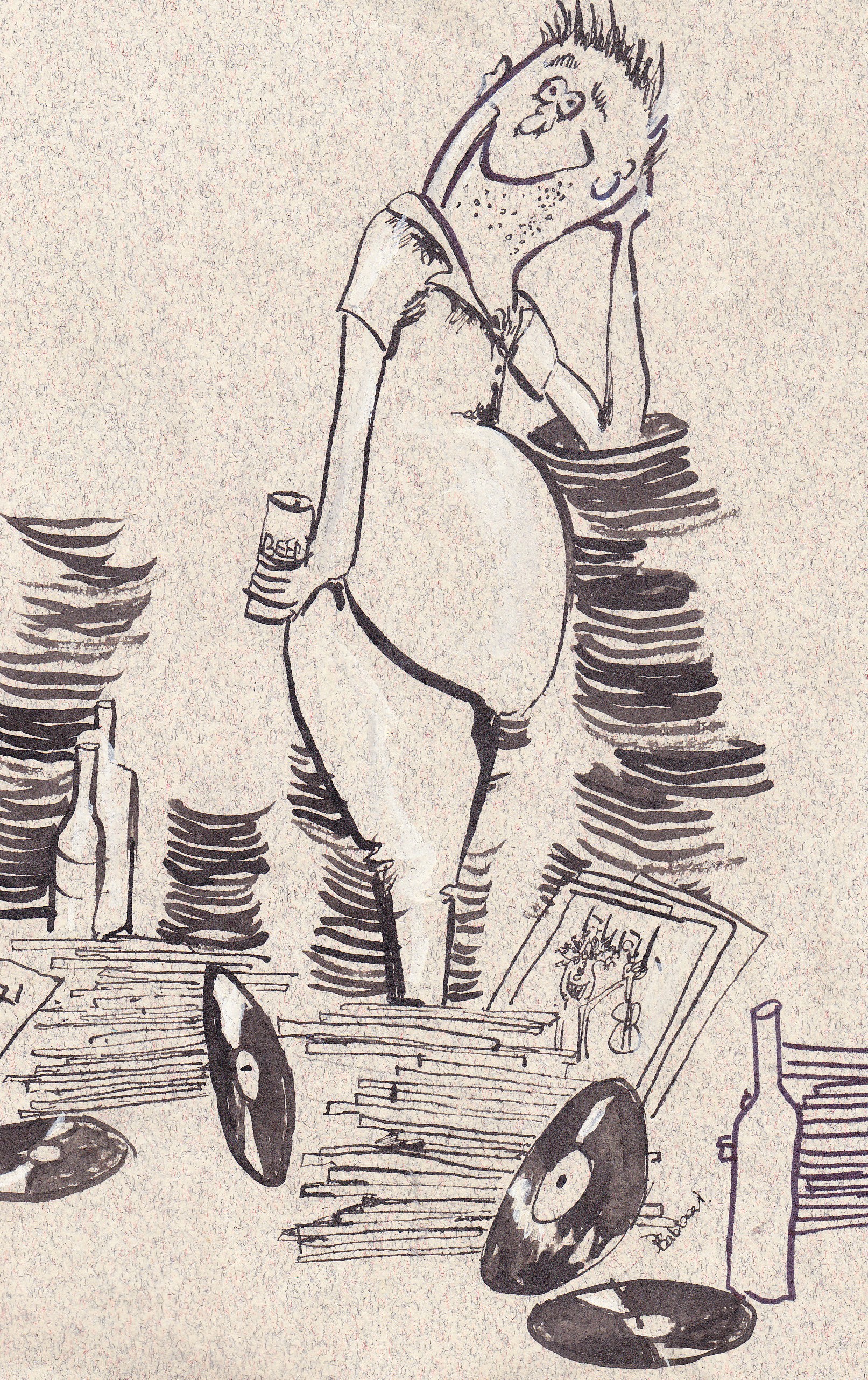Canned Heat
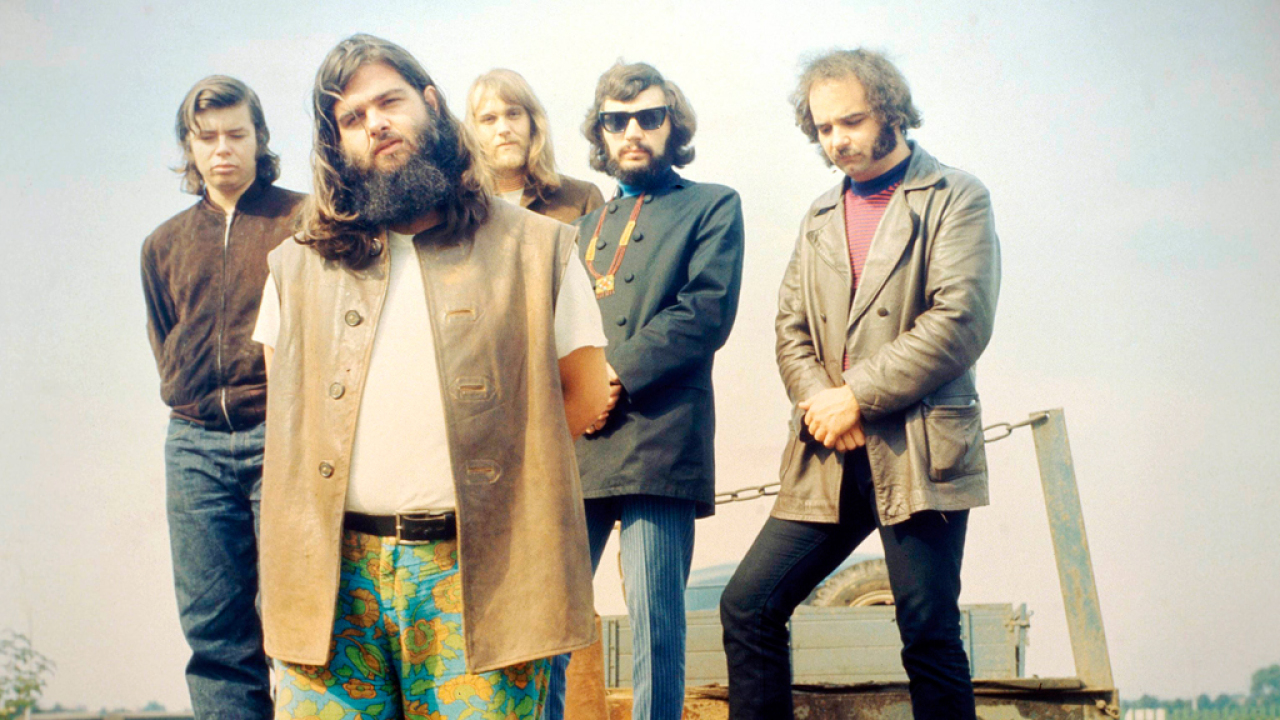 The classic Canned Heat Line-Up. Al "Blind Owl" Wilson, Bob Hite, Henty Vestine, Aldo De Palata and Harvey Mandell
The classic Canned Heat Line-Up. Al "Blind Owl" Wilson, Bob Hite, Henty Vestine, Aldo De Palata and Harvey MandellThe White Blues Band with an Unlikely Vocal Duo
I first heard Canned heat as I was driving from Adelaide to Melbourne, one long weekend. I did this quite regularly in those days. Suddenly, a bluesy song came on the car radio. It sounded like John Mayall. a bluesy song certainly strong on harmonica. I thought “Wow, they are playing John Mayall on the radio here in Victoria!” But of course, it was "Blind Owl" Wilson with the Canned Heat. And the heat certainly paralleled the Mayall Bluesbreakers with their genuine white blues music.
The late 60s and early 70s were a game-changing era in the American music scene. Bathed in the spirit of liberation, artists broke away from established norms to explore new forms of expression. Amidst this radical transformation, a notable blues band, Canned Heat, carved out a niche for themselves. Immersed in the raw spirit of the blues, the band introduced this timeless genre to a new generation.
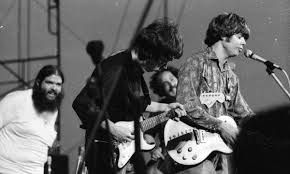 Bob Hite watches Al Wison at a live outdoor Canned heat show
Bob Hite watches Al Wison at a live outdoor Canned heat showCanned Heat Become Headliners
Canned Heat was envisioned by two blues enthusiasts, Bob Hite and Alan Wilson. In 1965, they formed the band with the original lineup featuring Stuart Brotman on bass, Mike Perlowin on lead guitar, Keith Sawyer on drums, and Henry Vestine (who replaced Perlowin later that year). Hite's dynamic blues vocals, coupled with Wilson's multi-instrumentalist talent, brought a refreshing uniqueness to Canned Heat's music.
Bob Hite, known as "The Bear" due to his imposing physical presence and deep voice, was an integral part of what made Canned Heat stand out. A passionate connoisseur of blues music, Hite had an extensive collection of blues records, and his knowledge of the genre profoundly shaped the band's music. Interestingly, it was a 78 RPM record of Tommy Johnson's "Canned Heat Blues" that inspired the band's unique name.
Throughout the years, Canned Heat saw numerous lineup changes. However, the core of the band, embodied by Bob Hite and Alan Wilson, remained intact.
Canned Heat Lineup Changes
Hite's friends Henry Vestine (who had been let go from Frank Zappa's Mothers of Invention for smoking pot), asked if he could join the band and was accepted, while Edwards was kept on temporarily. Soon Edwards departed (he went on to form the Stone Poneys with Bobby Kimmel and Linda Ronstadt), and at the same time Frank Cook came in to replace Holmes as their permanent drummer. Cook already had substantial professional experience, having performed with such jazz luminaries as bassist Charlie Haden, trumpeter Chet Baker, and pianist Elmo Hope, and had also collaborated with black soul/pop artists such as Shirley Ellis and Dobie Gray.
After joining up with managers Skip Taylor and John Hartmann, Canned Heat finally found a permanent bassist in Larry Taylor, who joined in March 1967. He was a former member of the Moondogs and the brother of Ventures' drummer, Mel Taylor, and already had experience backing Jerry Lee Lewis and Chuck Berry in concert and recording studio sessions for the Monkees.
Their passion for the blues and dedication to their craft helped weather the band through the changing times. Their music remained genuine and raw, and their performances were imbued with sentimentality and deep emotion.
One of the key influences that helped shape Canned Heat's music was the rough, raw, and unsanitized nature of the classic Delta Blues. The band was committed to preserving and promoting this traditional form of American music, and their repertoire often featured adaptations of classic blues songs. They managed to retain the essence of the original pieces while adding their unique, modern twist.
Just a year after the band’s formation, Canned Heat Records produced their debut album "Canned Heat." The album, brimming with traditional blues vibes, was an essential contribution to the late '60s music scene. Their interpretation of classics like "Rollin' and Tumblin'" and "Bullfrog Blues" were greatly appreciated by blues enthusiasts and garnished the path for future “boogie” bands.
Following their successful debut, Canned Heat produced several albums that contributed significantly to American music history. Their most commercially successful LP, "Boogie with Canned Heat," included the top ten hit "On the Road Again," a song that typified their unique blend of modern and traditional blues.
Even though Canned Heat was primarily known for their music, they also stood out for their advocacy of environmental issues. The band’s commitment to raising environmental awareness was best exemplified by Alan Wilson’s song "Poor Moon," which discusses the impending threat of lunar colonization.
Another key element of Canned Heat’s legacy was their fingerprint on landmark events in American music history. Notably, they performed at the original Woodstock Festival in 1969, an event that marked a defining moment in the history of Rock music. Their performance is still remembered as one of the highlights of the festival.
The tragic deaths of Alan Wilson in 1970 and Bob Hite in 1981 considerably affected the band. Both were instrumental in defining the sound and direction of Canned Heat. However, their passion for music and their deep, abiding love for the blues left a lasting legacy that continues to inspire musicians worldwide.
Now over 50 years since its inception, Canned Heat’s music still affirms the worth of looking at, buying their records and savoring their unique blues-rock sound. Their legacy continues to attract new generations of music lovers who appreciate the band’s authenticity, originality, and the raw, emotive power of the blues.
Even today, the American Band Canned Heat remains an embodiment of blue-collar virtuosity, a testament to the enduring significance and appeal of blues music. Their deep respect for classical blues coupled with their modern adaptations has immortalized them in the annals of American music history.
In conclusion, Canned Heat's story celebrates the transformative power of good music. Whether through their distinct sound, the personalities of the band members like Bob Hite, or the timeless appeal of their records, the band's enduring legacy is a powerful reminder of the transformative power of the blues. It's a story of perseverance, passion, and undying love for music- a story that still resonates today.
Frank Cook was replaced with Adolfo de la Parra, who had been playing the drums in Bluesberry Jam (the band which evolved into Pacific Gas & Electric). As an official member of Canned Heat, de la Parra played his first gig on December 1, 1967, sharing top billing with the Doors at the Long Beach Auditorium. This began what de la Parra refers to as the classic and perhaps best known Canned Heat lineup, which recorded some of the band's most famous and well-regarded songs. During this "classic" period, Skip Taylor and John Hartmann introduced the use of band member nicknames:
- Bob "The Bear" Hite
- Alan "Blind Owl" Wilson
- Henry "Sunflower" Vestine (and later Harvey "The Snake" Mandel)
- Larry "The Mole" Taylor
- Adolfo "Fito" de la Parra
Despite these challenges, Canned Heat continued to make records and perform at concerts. They remained dedicated to their mission of keeping blues music alive. Their work serves as a valuable reminder of the enduring power of good music and its potential to evoke deep sentiments.
Listening to Canned Heat’s discography is like stepping into a blues time capsule. The music, heavily steeped in tradition yet undeniably unique, resonates with a sense of enjoyment that has stood the test of time. It's like a musical journey through the heart and soul of the blues.
Canned Heat's contribution to blues music is worth appreciation and recognition. They played a pivotal role in reviving and popularizing traditional blues in an era dominated by rock music. This led to a resurgence of interest in the genre, influencing a generation of musicians and inspiring them to explore the richness of blues.
Canned Heat’s story isn’t just about the creation of enjoyable music. It reflects a commitment to preserving a slice of American musical heritage, an expression of deep, unadulterated emotion, and a firm belief in the transformative power of music. It’s also about a group of passionate artists who blazed a trail for others to follow.
For those music enthusiasts interested in the spirit of the 60's and 70's music era, adding some Canned Heat Records to your collection could prove a rewarding experience. Their unique sound, a mix of traditional blues and rock, showcased the versatility and vibrancy of the era's music.
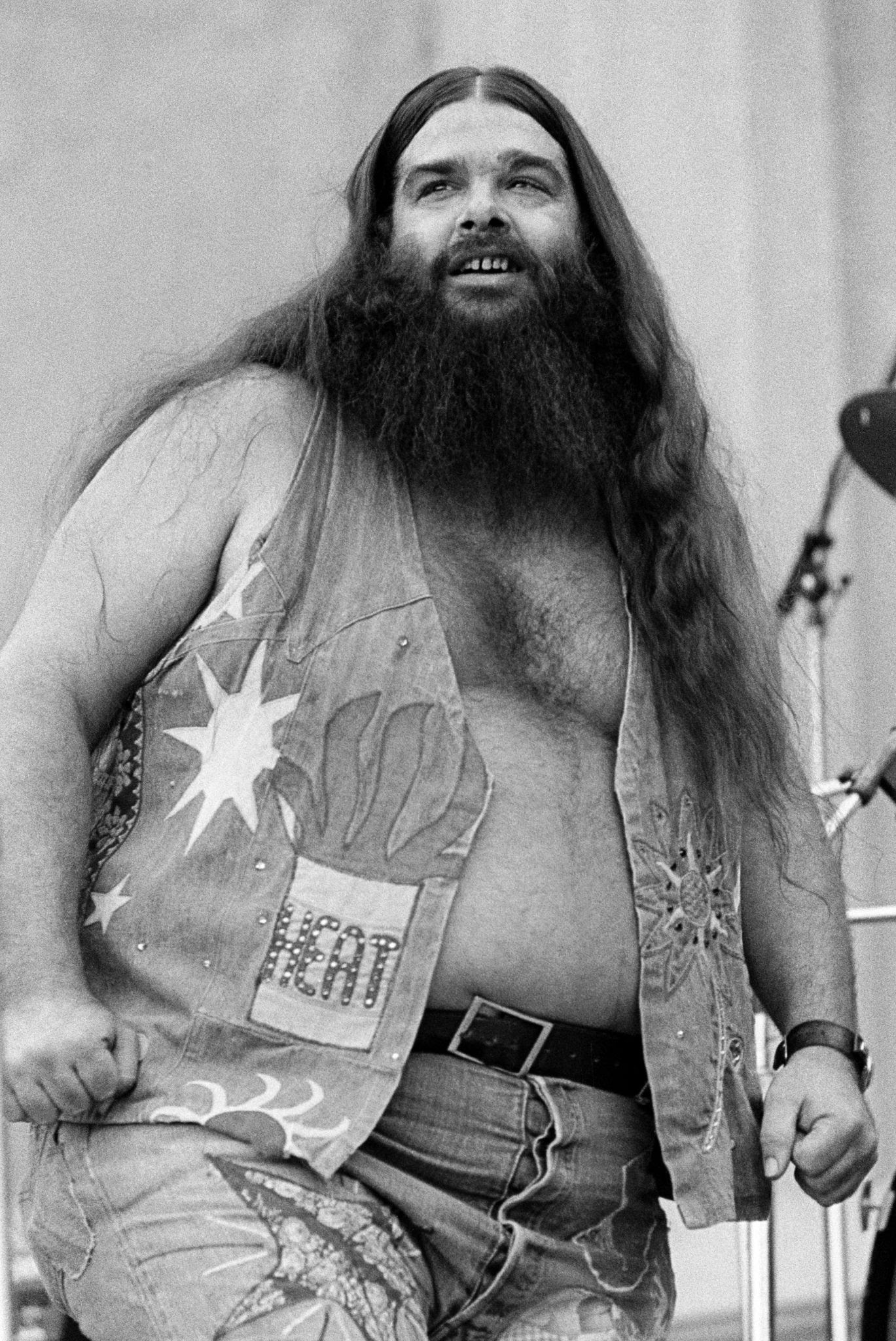
Death of Bob Hite
On April 5, 1981, having collapsed from a heroin overdose during a show at the Palomino in Los Angeles, Bob Hite was later found dead in de la Parra's Mar Vista home at the age of 38
None of his Canned Heat bandmates took great notice when the group's rotund, over-indulgent frontman, fell to a dressing room floor during an apparent overdose. Instead, they returned to the stage for a second set at the Palomino Club in North Hollywood.
“He’d collapsed so many times before,” drummer Adolfo "Fito" de la Parra told Classic Rock. “Drugs, usually. So we were used to leaving him when he passed out onstage. Who can lift a 300-pound man? Every other time, he’d wake up in the morning and say, ‘What the f--- happened?’ ... Er, you got wasted again.”
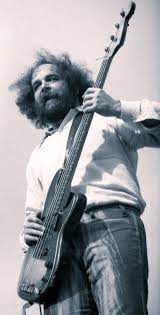
Death of Larry Taylor
In 1972, Larry played on the Ventures album Rock and Roll Forever.
Taylor was the younger brother to Mel Taylor (1933-1996), drummer for The Ventures. In 1972, Larry played on their album Rock and Roll Forever. He also played bass on the Monkees albums, “The Momkees”, “More of the Monkees”, ”Instant Replay”, }The Monkees Present” and Changes”
Larry Taylor died on 19 August 2019 at the age of 77 from a 12-year long battle with cancer.
Canned Heat on Vinyl
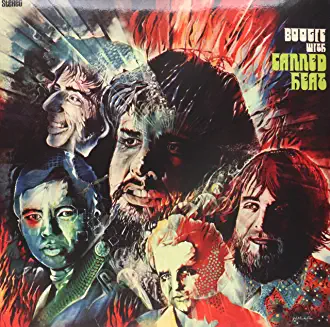
"Boogie With Canned Heat"
Their most successful album “Boogie With Canned Heat” contained their classic hit "On The Road Again". The album was critically acclaimed on release, The Encyclopedia of Popular Music saying the album an "impressive selection," and praised the "in-concert favorite" "Fried Hockey Boogie". Rolling Stone wrote that "'An Owl Song' is perhaps Al Wilson's strongest vocal outing to date — his peculiarly high crooning mumble grooving along over a kicking, chugging rhythm section." Ten tracks in all.
Fried Hockey Boogie" was the first example of one of Canned Heat's boogies, or loose jams.
Side one
1."Evil Woman"
2."My Crime"
3."On the Road Again"
4."World in a Jug"
5."Turpentine Moan"
6."Whiskey Headed Woman No. 2"
Side two
1."Amphetamine Annie"
2."An Owl Song"
3."Marie Laveau"
4."Fried Hockey Boogie"
Buy Boogie With Canned Heat Now!
Enjoy this site? Share with friends!
